When diagnosing gout, doctors recommend that patients change their diet first, along with medication. Diet for gout is an essential component of complex treatment of the disease. Its use will speed recovery as quickly as possible, relieve pain symptoms quickly, reduce the severity of seizures, and prolong remission periods.
Dietary principles and benefits
The main goal of diet therapy is to organize a diet that will help fight pathology and prevent relapses. The gout diet aims to:
- regulation of purine metabolism;
- reduction in urate content;
- normalization of the process of removing excess uric acid;
- regulation of metabolic processes;
- increase in urinary alkalinity;
- weight loss in overweight;
- overall patient health.
Hypopurine-type diets are formulated based on therapeutic principles and the rules of diet regimens, including the prohibition of foods high in purine compounds, salts, and oxalic acids. Consumption of fats, carbohydrates and protein compounds also needs to be reduced.
Therapeutic diet and diet for gout provides for increasing the share of vegetables, fruits, natural drinks, kefir, curd in the diet. The most effective is a 4 to 5 single diet with an average caloric intake of 2, 500 to 2, 800 units.
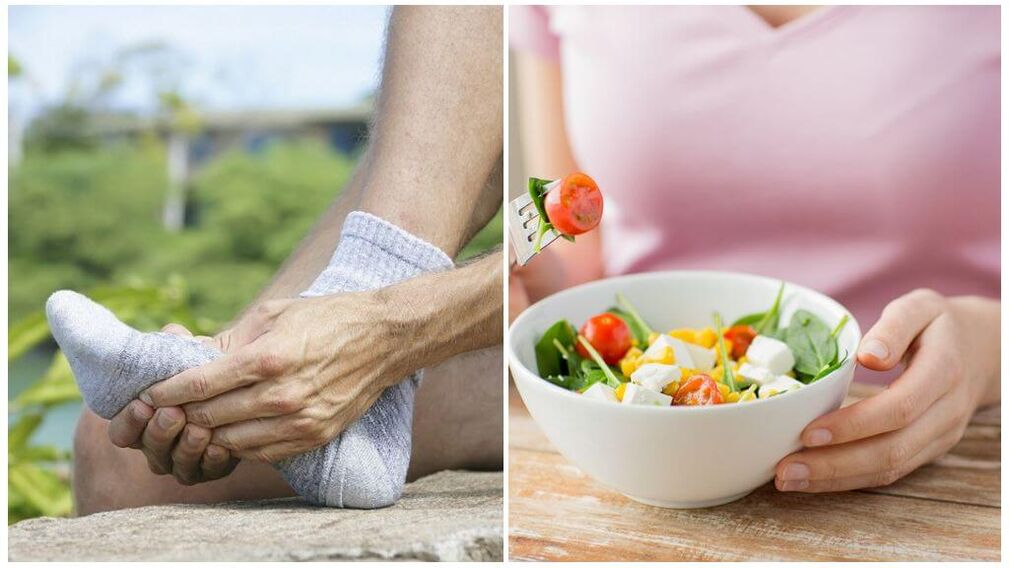
Important!
The drinking regimen should ensure that 2, 5 liters or more of fluid enters the body.
How to organize meals
To maximize the effectiveness of your gout diet, you need to follow a few recommendations:
- the main method of cooking is cooking, baking, steaming;
- after 10 minutes of cooking, dry the meat broth;
- alternative meat, fish and vegetarian dishes;
- use only natural liquids;
- to spend the days of fasting;
- avoid fasting.
Important!
In the case of chronic diseases, it is necessary to consult a specialist for the development of an individual nutritional system.
The main types of diets
Organizing a proper therapeutic diet will not completely eliminate gout, but will significantly alleviate the onset of the pathology and prevent its recurrence. The type of diet prescribed will greatly depend on the general condition of the patient, his weight, the presence of additional diseases, and even gender.
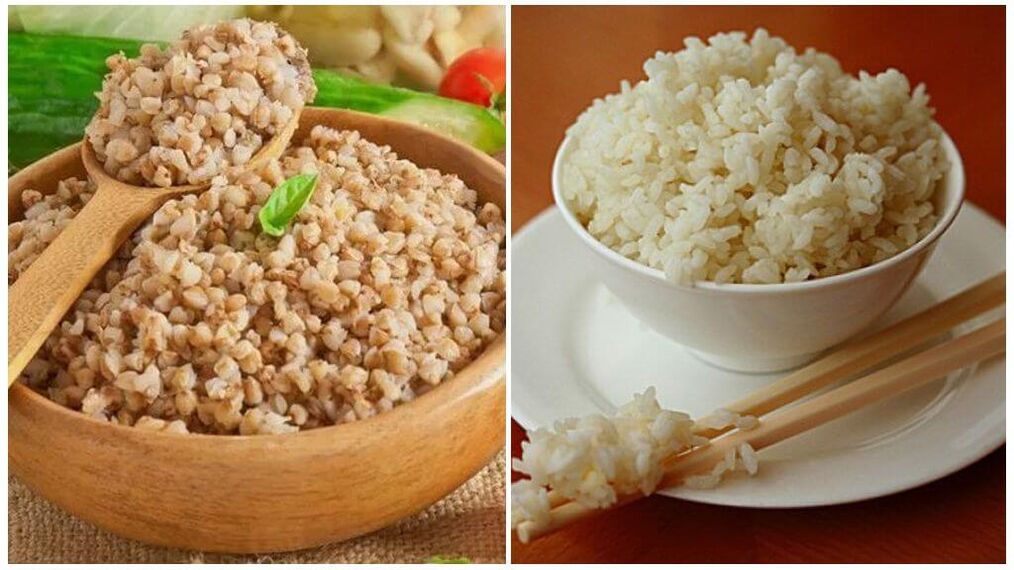
The main type of diet for medical gout is diet - table number 6. In addition, people with gout, especially those suffering from shortness of breath and overweight, often use diet table number 8, alkaline, rice and buckwheat diets. Kefir, cottage cheese, fruit or vegetable diets are perfect for fasting days.
Diet table number 6
It is used primarily in patients with gout. This allows the exchange of purine compounds to be normalized in a short time and the causes of crystallization and accumulation of uric acid salts are eliminated.
Adherence to dietary requirements reduces the activity of uric acid reactions in the body. As a result, the patient's well-being improves, the inflammatory process stops growing, the swelling decreases, and the feeling of joint pain and stiffness disappears.
Diet high in uric acid
It is based on the abandonment or reduction of products high in salt, refractory fat, salt.
It is proposed to replace them with alkaline products: dairy products, sour milk, curd, fruits and vegetables. The diet provides one day of fasting per week.
Diet for exacerbation of gout
In particular, during exacerbation, the amount of fluid to be taken should be increased to 3 liters. Then completely exclude dishes with meat and fish. The lack of animal protein can be compensated by increasing the proportion of milk and sour milk products in the diet.
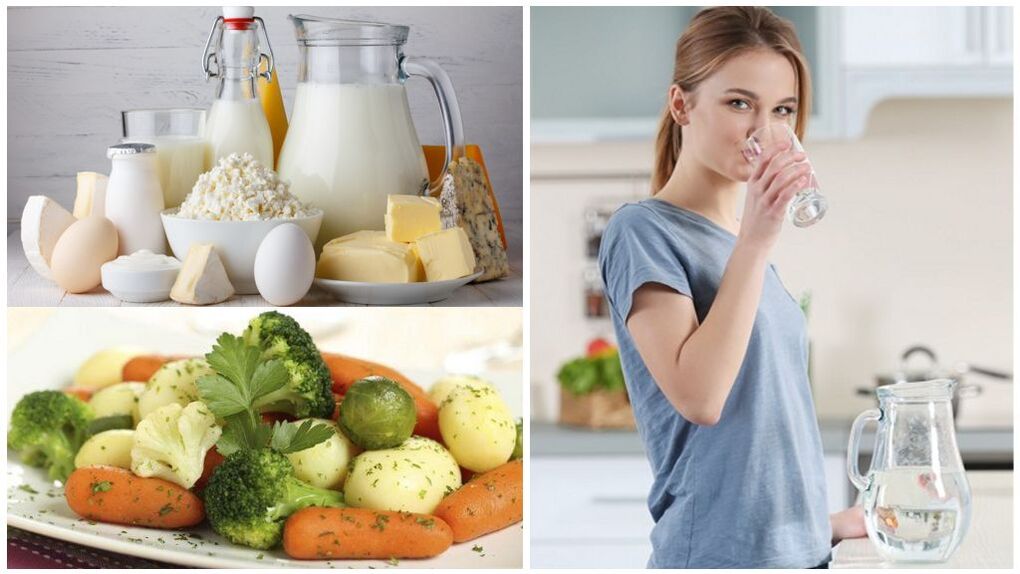
After the acute period of illness, fasting days should be organized every other day, eating one type of food (curd, kefir, cooked vegetables, fruit).
Important!
Fasting causes a sudden release of uric acid and is strictly prohibited in gout.
Diet table number 8
Table 8 strictly regulates the diet of gouty feet in overweight patients. This diet is designed to speed up metabolism and get rid of excess fat from the body.
The main difference from the general requirements for a therapeutic diet for gout in this case is a moderate reduction in caloric intake and consumption of oral fluids, an average of up to 1. 5 liters per day.
On a note!
For men with gout, the diet provides for a minimum caloric intake of 2, 100 to 2, 500 units. In women with gout, diet number 8 limits the menu from 1400 to 1700 kcal.
Buckwheat diet
The low calorie content of buckwheat allows them to be used in a therapeutic diet. Its consumption restores impaired metabolic processes, quickly gives a feeling of satiety and allows you to forget about hunger for a long time. Buckwheat is a leader in vitamins and all kinds of trace elements.
Vegetable cereal proteins are better absorbed and can completely replace an animal. During the recovery of bone and muscle tissue, the product helps in regeneration processes. Buckwheat porridge together with kefir is perfect for fasting days with gout.
On a note!
Buckwheat with diet food is more often prepared without salt. Buckwheat diet allows you to lose weight quickly, which has a positive effect on the joints prone to destructive effects of gout.
rice diet
The rice diet is mostly used to cleanse the body and lose weight. Rice with gout speeds up metabolism, removes excess water and salt, and relieves swelling. Manganese, selenium, phosphorus, iron, zinc, which are part of rice, have a positive effect on all life support systems in the body.
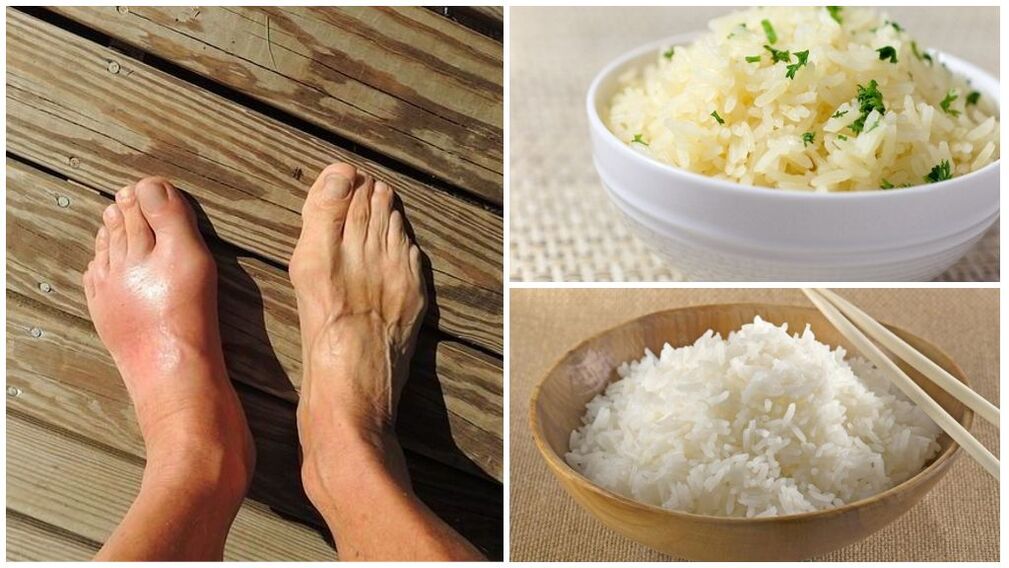
The porous structure of the grain removes the accumulated harmful toxins, salts and slag from the diseased joints. The rice diet can also be used on fasting days, especially during an exacerbation of gout.
Important!
Only brown or white long grain parboiled rice is used in the diet. In the treatment of gout with diet, these grains can be consumed daily.
alkaline diet
Increased acidity in the body adversely affects metabolic processes. This is accompanied by a lack of calcium and the destruction of bone tissue. The use of an alkaline diet will help prevent health-threatening processes. The basis of the diet is fruits, sour milk and dairy products. This diet can be used both during the exacerbation of gout and during the remission stage.
Prohibited and permitted products
In order to properly restore the nutritional system, it is necessary to know which foods will be useful and will help in the fight against gout, and which will have harmful effects and cause exacerbation of the disease.
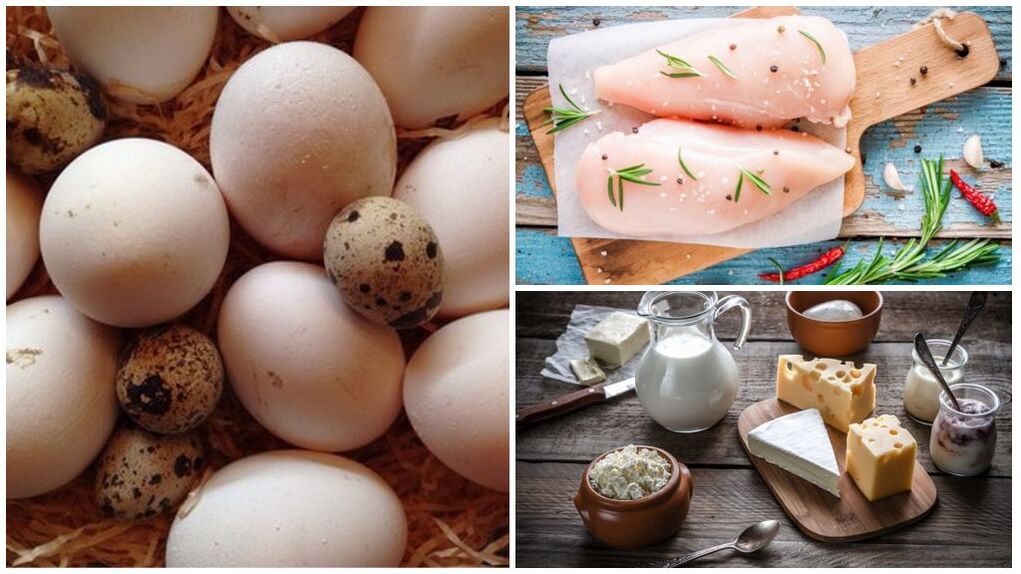
The list of major gout diets can list all foods, taking into account the quantitative content of purines, salt, fat and other harmful substances. The main feature of the division of the list of products for gout is the amount of purine compounds.
| High purine content | Low purine content |
|---|---|
|
|
Important!
Drinking any amount of alcohol is strictly prohibited in gout.
What products are useful
Determining the amount of purines and unhealthy fats in your diet can tell you exactly what foods you can eat for gout without harming your health, and which should be limited.
On a note!
Fruits, especially useful in the treatment of gout, are pears, bananas and apples. Malic acid, which is part of the fetus, can neutralize the effects of uric acid.
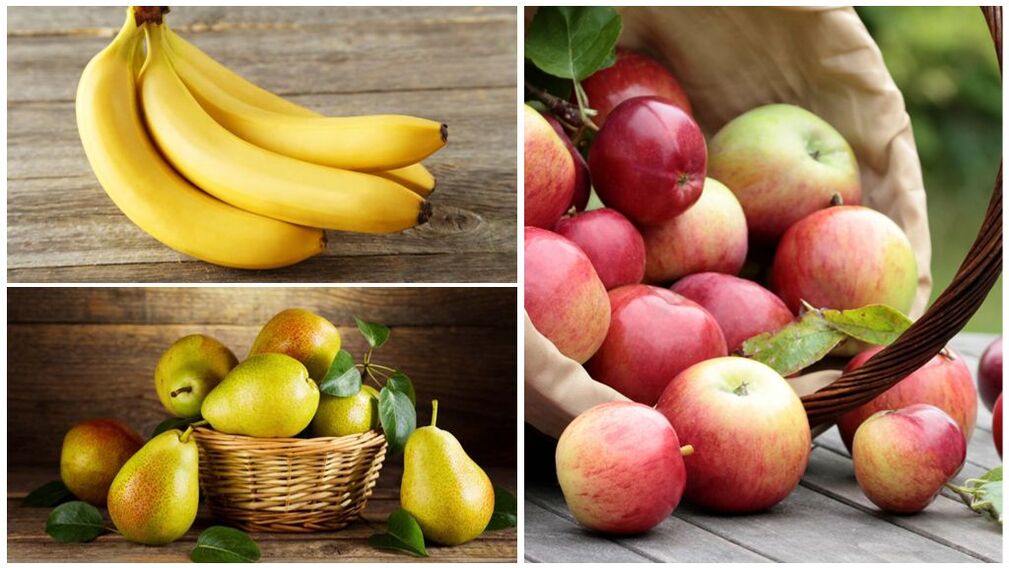
Potassium destroys uric acid crystals, which contributes to its faster elimination from the body. Ascorbic acid heals, regenerates and strengthens the connective tissues of the joints. Fruit nutrition in fermented dairy products is especially useful.
The great benefits of gout will come from the regular use of fresh cherries and cherry compotes. The berries contain antioxidants that act against free radicals. Bioflavonoids and anthocyanins protect against the inflammatory process of gout.
The beneficial substances found in strawberries and strawberries neutralize uric acid and prevent its crystals from forming in the joints.
On a note!
You can include these berries and fruits in your gout diet in unlimited amounts.
What food should not be eaten
In addition to the products listed in the summary table, strong meat, fish and mushroom broth should be excluded from the diet. They are contraindicated because they contain a lot of purines, which can cause a sudden exacerbation of gout. Fish and canned meat, which are high in salt, are also undesirable. Their use with a purine diet disturbs the water and salt balance and contributes to the additional deposition of salts in the tissues of the joints.
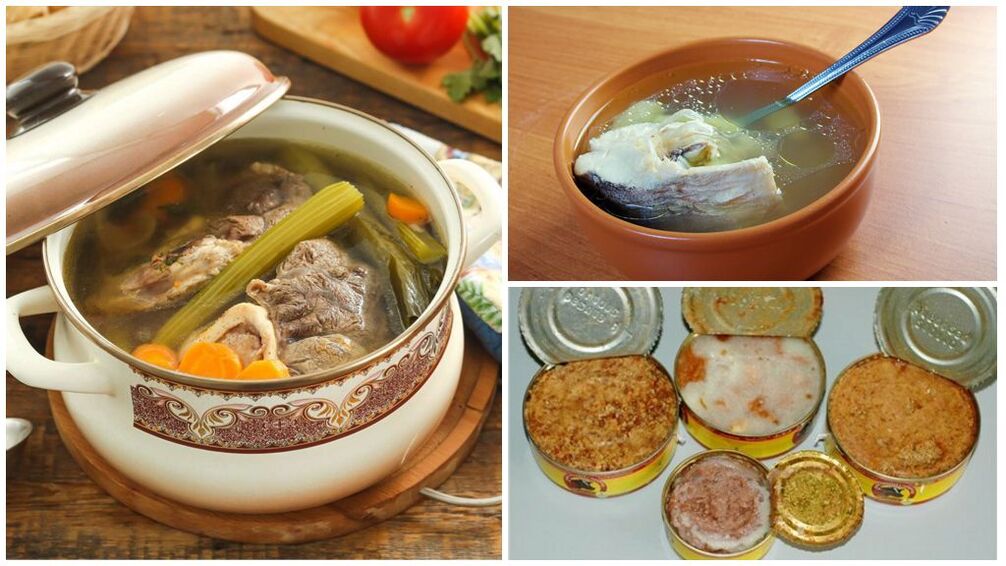
Tea, coffee and cocoa are also on the list of banned foods for gout. These drinks should not be taken with gout as they trap uric acid in the body, interfering with its withdrawal process. This leads to relapse.
Daily menu for the week
An extensive list of products that are allowed to be used allows each patient with gout to choose their meals and eat right. The recommended weekly diet is balanced, wholesome and consists of foods that are good for gout.
| Breakfast 1 | Omelette with herbs, rosehip broth, carrot salad |
| Breakfast 2 | Banana, kefir |
| Dinner | Vegetable soup with vermicelli, boiled potatoes, rabbit in onion sauce, apple juice |
| afternoon tea | Apple, cheesecake, lemon tea |
| Dinner | Zucchini caviar, kissel |
| Breakfast 1 | Rice porridge, pear broth, tomato salad |
| Breakfast 2 | Fruit salad, kissel |
| Dinner | Onion soup, barley porridge with wild mushrooms, dried fruit compote |
| afternoon tea | Pear and pumpkin chips |
| Dinner | Curd souffle, linden tea |
| Breakfast 1 | Wheat porridge, apricot juice |
| Breakfast 2 | Yogurt with cherries, rosehip broth |
| Dinner | Soup with fish balls, vegetable stew, apple jelly |
| afternoon tea | Cheesecakes with sour cream, compote |
| Dinner | Pancake with prunes, kefir |
| Breakfast 1 | Rice stew, milkshake, cabbage salad with apple |
| Breakfast 2 | Strawberries with cream, green tea |
| Dinner | Beets with sour cream, buckwheat, turkey breast with prunes, mint tea |
| afternoon tea | Pancakes with strawberries and carrot juice |
| Dinner | Cheese casserole with herbs, pear compote |

| Breakfast 1 | Oatmeal with raisins, tomato juice, fruit salad |
| Breakfast 2 | Cucumber salad with olive oil, orange juice |
| Dinner | Buckwheat soup, zucchini fried with rice, orange juice |
| afternoon tea | Banana, oatmeal jelly |
| Dinner | Steamed fish with vegetables, kefir |
| Breakfast 1 | Millet porridge, plum juice |
| Breakfast 2 | Salad with young carrots and garlic and apple |
| Dinner | Egg soup, cabbage rolls with vegetables and turkey, apple juice |
| afternoon tea | Curd with bananas, strawberry tea |
| Dinner | Rice pudding, tomato juice |
| 1 breakfast | Boiled egg, green tea |
| 2nd breakfast | Pears, green tea with marshmallows |
| Dinner | Borscht without meat, pasta and cheese, fruit compote |
| afternoon tea | Apples fried with curd, lemon drink |
| Dinner | Vinaigrette, decoction of linden flowers |
Permitted vegetables and fruits can be consumed in unlimited quantities as an addition to the main menu. Wheat bread is better not to eat in patients with gout, including the big toe.
Important!
Foods to which natural honey has been added to prevent gout can cause an allergic reaction.
Diet recipes
The weekly sample menu on offer includes many diet dishes tailored to what you need to eat. If desired, they can be replaced with a list of permitted foods for gout and recommendations on what can and should not be eaten in gout.
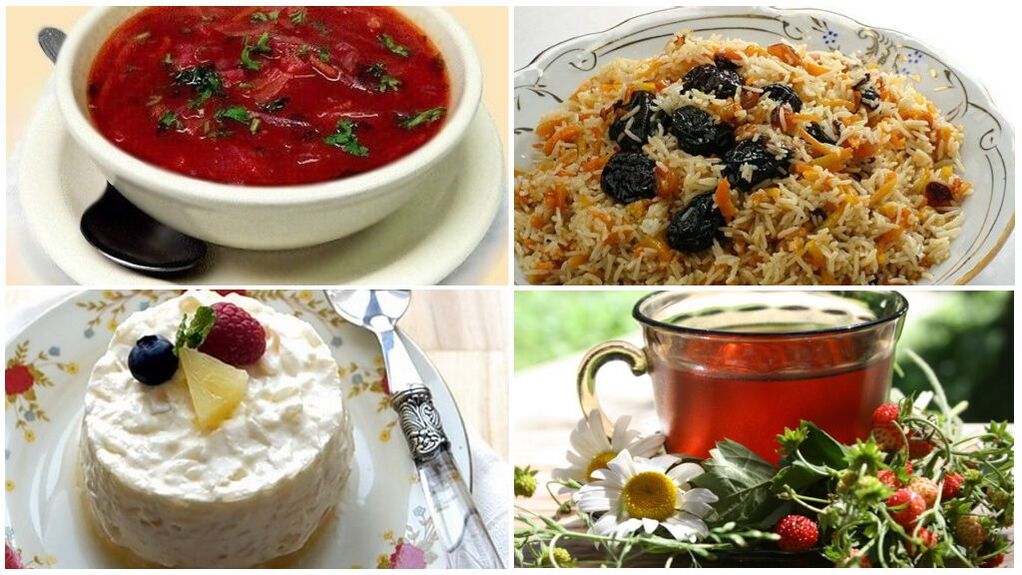
Borscht without meat
Peel 1 beet, carrot, onion. Saute the diced onion in olive oil and the grated vegetables, adding the tomato or 1 tbsp. l. tomatoes. 4 potatoes cut into cubes, boil in 1. 5 liters of water. 10 min. Stir in the chopped fresh cabbage until cooked through. 5 min. - vegetable stew. Season with salt to taste. Serve with parsley, dill and a tablespoon of sour cream.
Pancake with plums
Wash a glass of rice. Put 2 strips of onions and 2 cubes of carrots in a saucepan with vegetable oil. Saute everything a little. Add 10 pieces of washed and chopped prunes. We fry everything until the vegetables are soft. Add the rice, stir to completely saturate the oil, pour 2 cups boiling water. Add spices and salt to a minimum. After boiling, reduce heat and cook for 20 minutes under a tight lid.
rice pudding
Boil half a cup of rice in 1 liter. water for 10 minutes. Drain the water, wash the rice. Pour into a glass of milk and cook for another 25 minutes. until soft porridge is obtained. We beat 2 eggs and evaporate 50 g of raisins. Mix everything with the cooled porridge, pour salt on the tip of the knife and 1 tbsp. Sahara. Bake in the oven over medium heat in a greased skillet until golden brown. Serve with cherry syrup.
strawberry tea
Pour a pinch of dry leaves with strawberries in a glass of boiling water, soak for 3 minutes. Drink without sugar.
By using these recipes every day, you can improve your well-being and reduce the manifestations of the pathology.
Conclusion
Proper nutrition in gout should become a daily part of the patient's life. This will slow down or even stop the development of the pathology. This will protect other organs from damage.
Important!
It should be remembered that diet is a supplement to drug therapy, not a substitute. The recommendations of a rheumatologist should be followed at all stages of treatment.
















































































